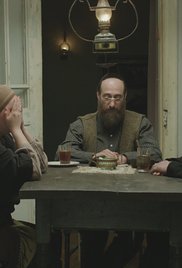
SONG OF SONGS
Ukraine, 2015, 74 minutes, Colour.
Directed by Eva Neymann.
Song of Songs is a brief poetic film, based on the stories of Sholem Aleichem, of life in a Ukrainian Shtetl in 1905. It is still a very old-worldly atmosphere, although there is a brief comic sequence with a group of musicians posing for a photo and an old-fashioned camera and photographer.
In the first half of the film, there is a visual attention to the life, the homes, the streets, the occupations, the schools, the religious men, the pious Jewish atmosphere. In the latter part of the film, the focus is on two young people whom we have seen together when there were children, the boy thinking that he was a Prince and the girl was a Princess and that they would go far away. In their growing up, they play with each other, have a great affection for each other – but there is the caution that it is not appropriate according to the law for them to touch.
In the second part of the film, the boy has grown up, gone away to study, returns to the Shtetl, quite impressive in his appearance and manner, yet very serious, because the young woman is betrothed to someone else. They meet. There is a bond between them but a quiet frustration for the young man that they can never marry. In the final part of the film, they go at into the woods, a beautifully sunny day, attractive photography, the lyrical atmosphere as the audience watches the two, contemplates their love, and the dialogue draws on the biblical book of the Song of Songs, some of the Biblical text, references to the text – especially in the sensual images which are poetic expressions of the glory of human love.
The film was awarded an Ecumenical Commendation at the Czech Festival in Karlovy Vary, 2015.
1. The audience for this film, Jewish audience, Ukraine, universal?
2. The title, the biblical reference, the use of the text, expanding on the central idea of the text? Its spirituality?
3. Ukraine, the end of the 19th century, life in the Shtetl, the homes, interiors, poor, the yard? The walk along the streets, the pavement, the gutters? The range of people? The photographer and his long posing of the musicians, the carrier wanting to get into the photo? The religious men, prayer? The school, the obese teacher? Studying Genesis? Shimek and the buttons?
4. Shimek, his age, his voice-over, at home, dressing, his mother blowing his nose, going to school, stepping in the puddle, at school, on the bench, his behaviour, answering the questions, not sure of the answers, the buttons?
5. The detail of the household, the detail of the Shtetl, the father, having the letter read to him, the mother, the washing and her duties at home? Their personalities?
6. Shimek, his comment that he and Buzya were Prince and Princess, the plan, to go away together? The playing together, the attraction, talking? Buzya and background, her story, her personality, age?
7. Growing up, sharing together, the comment about brother and sister, love, the ritual not allowing them to touch? The lyrical scenes in the woods?
8. Growing up, Shimek going away, his return, his studies, appearance, needs young man and his clothes, with the family? The adult Buzya, her presence, engaged? Meeting the family? Shimek and his sadness, his continued love for Buzya?
9. The picture of the groups and family, posing, the response to this situation, the wedding?
10. The long sequences of Shimek and Buzya together, the language of the Song of Songs, the Biblical tone, the text, the lyrical images? The beauty of the photography and the woods? Symbolising the love between the two?